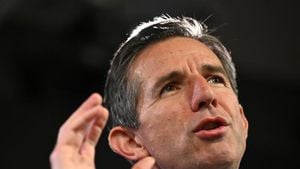Delhi has once again descended under the heavy shroud of pollution, alarming citizens and prompting urgent measures from local authorities. The air quality index (AQI) has soared past 450, categorizing it as 'severe-plus,' raising red flags about public health.
Environment Minister Gopal Rai has been vocal about the measures needed to tackle this persistent issue, recently appealing to the central government for immediate approvals on cloud seeding, which he sees as a potential remedy. "The only way to break Delhi's thick smog layer is through wind or rain," he says, emphasizing the urgency for artificial rain to cleanse the polluted air.
Even as the Delhi government's request for cloud seeding remains hanging, they are not resting idle. Alongside these calls for high-tech solutions, Rai announced the deployment of 588 teams from civic agencies across the city to identify open burning incidents—one of the significant contributors to the region's deteriorated air quality.
This year's pollution crisis can be attributed largely to stubble burning by farmers, which accounts for up to 40% of the pollution, according to the weather forecasting agency SAFAR. This practice, especially rampant during the post-harvest season from September to November, exacerbates Delhi's air quality, compounding the effects of vehicular emissions and construction dust.
Almost daily, residents are left gasping as visibility drops to dangerous levels—so low, in fact, it affects air travel. Just recently, 14 flights had to be diverted due to the smog. The capital's strategic location and winter meteorological conditions trap air pollutants, creating layers of toxic smog.
Currently, Delhi is also operating under Stage 4 of the Graded Response Action Plan (GRAP), which is activated whenever air quality reaches crisis levels. The Supreme Court has weighed in, declaring it won't allow downgrading from GRAP-4 until conditions significantly improve. The measures implemented under GRAP-4 include banning trucks except those carrying essentials, halting construction activities, and even advising offices to reduce their workforce by 50%.
Universities are feeling the pinch of poor air quality as well. Delhi University and Jawaharlal Nehru University have transitioned to online classes to protect students until the air quality improves. The decision reflects growing concern over the health impacts of continued exposure to dangerously polluted air.
Rai has articulated frustration with what he calls "political inertia," tying political nonchalance to delays in implementing effective pollution control measures. Despite repeated appeals for intervention, there's been no substantial response from higher authorities.
Even with these efforts, forecasts remain grim. Weather patterns indicate heavy fog and unfavorable winds are likely to keep pollution trapped over the city. Indeed, the India Meteorological Department has forecast no immediate relief, advising residents to prepare for sustained levels of pollution.
This perennial crisis has sparked debates over the effectiveness of the current strategies and whether more innovative approaches, such as cloud seeding, can bring relief. Meanwhile, with winter deepening, pollution levels are expected to continue hovering at hazardous heights.
The Delhi government’s declaration of the situation as a “medical emergency” has been met with mixed responses. While immediate steps to mitigate exposure have been taken, there’s still palpable frustration among residents about the long-term solutions and whether policymakers will embrace stricter enforcement of pollution controls.
For residents of Delhi, each day holds the challenge of coping with some of the worst air quality globally. With students relegated to virtual classrooms, flights diverted, and public health bogged down by pollution, there’s no denying the urgency for effective solutions. The question on everyone’s mind is whether the government will respond swiftly enough to tackle this continuing crisis.



